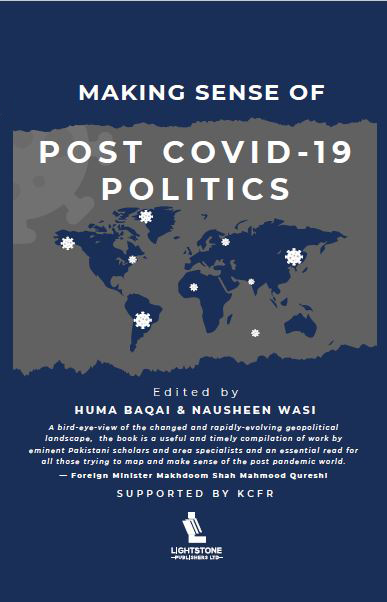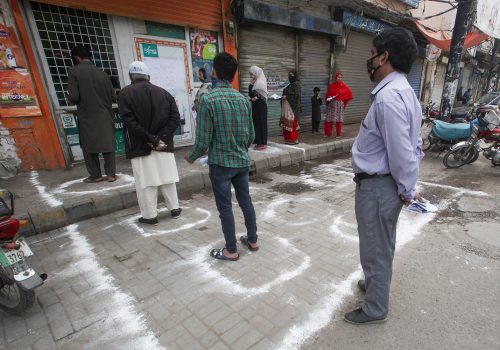From our personal lives to geo-politics, we have been living in unprecedented chaos spiralled by an infinitesimal creature — corona virus. During these perplexing times, getting your hands on a book like Making Sense of Post COVID-19 Politics is a treat for thousands of readers seeking comprehensive literature on the post-pandemic geo-political and geo-economic scenario, featuring Pakistan as well.
The 133-page book is a timely compilation of work by 12 prominent Pakistani scholars and analysts. Edited by International Relations maestros, Dr. Huma Baqai, and Dr. Nausheen Wasi, the book is a predictive analysis of the post-COVID-19 world.
In its eleven chapters, the manuscript explores wide ranging topics like security threats, ideological politico-economic divide, human security, response mechanism to the pandemic, the Kashmir issue, and Pakistan’s domestic politics vis-à-vis the 18th amendment, with regards to COVID-19 circumstances.
The editors impeccably manage to keep a coherent sequence throughout the eleven chapters. The book takes off with a chapter on historical analysis of world politics since the cold war era. Dr. Nausheen Wasi intelligently draws parallels between the onsets of the COVID-19 pandemic and the politics of radicalisation — as in how both phenomena bore predictable outcomes. The author further makes a solid case against the rise of populist politics and leaders like Donald Trump, which resulted in a delayed and inept response to COVID-19.

Dr. Rabia Akhtar, an eminent scholar from the University of Lahore, carries forward the debate in her derisively-named article Pandemic and the Geopolitical Dilemma: Battle of the Elephants. Referring to the two obvious elephants — the US and China — she argues that the pandemic-induced environment favours Beijing’s diplomacy style, thus creating insecurity and angst in Washington. The world is already witnessing a spike in tensions between the two elephants, as US President Donald Trump has repeatedly termed the corona virus a ‘Chinese virus.’ Dr. Akhtar writes, “With the chorus of censure from the US on China in full swing, one cannot emphasize the repercussions on the conflict-propensity between the two countries.”
Continuing the discussion in a new chapter, Dr. Huma Baqai, and her research associate claim: “The COVID-19 could mark a ‘COVID Moment’ for the United States if it does not rise to meet global expectations.” The authors converge all the facts — China’s revival of the ancient Silk Route, its ‘survivor turned saviour role’ in the corona crisis, and the IMF’s positive projections of its economic growth — to demonstrate how Beijing is superseding Washington as a world leader.
The authors predict that hard power politics and capitalist-exclusive economic models may become irrelevant in the post-COVID-19 era. The chapter ends on a million-dollar question: “Will the West recover, revamp, and continue or will China emerge as an alternative?”
Esteemed historian Dr. Bettina Robotka firmly believes that Pakistan’s foreign policy would also garner many profits from the Eurasian concept.
Shedding light on the COVID-19 episode from the lens of globalisation, Shahid Hameed, a Ph.D. scholar at National Defence University, strikes up an interesting debate on how the corona outbreak has changed the ‘globalisation of world politics’ into ‘the world’s politics of globalisation.’ He introduces the concept of ‘controlled globalisation’ for the post-pandemic world politics in order to effectively deal with an invisible enemy like the corona virus in the future.
After wrapping up myriad aspects of controlled globalisation, the book hops onto the subject of market economy versus social ideology through the pen of prominent economist Dr. Kaiser Bengali. Those readers who believe in the cause of socialism would find this chapter worth reading. As the corona crisis mars the world, the author powerfully advocates against the preventive measures, which are solely driven by capitalist and neoliberal approaches. In his scathing remarks, especially pertaining to the miserable healthcare system of the US, Bengali writes, “The corona invasion has exposed the abject hollowness of the neo-liberal market economy paradigm.” This particular chapter is extremely rich in content, with its hard-hitting commentary on the ideological political economy divide.
The second half of the book turns out to be quite fast-paced, wherein Dr. Ishrat Afshan Abbasi, a scholar at the University of Sindh, focuses on human security concerns. Under the framework of International Human Rights Law, Abbasi broadly explains how and why certain restrictions on human rights during pandemics are legitimate to counter COVID-19. She has also given a number of suggestions to governments about effectively tackling the pandemic. Keeping up with Abbasi’s notion, Saira Bano Orakzai, an associate chair at Nelson Mandela University, examines the scale of difficulty and challenges for policymakers in the fight against corona virus.
Ikram Sehgal presents a much needed solution by determining FinTech as a way forward for not only the problems that have surfaced since the pandemic, but to help resolve the long-standing structural financial issues of Pakistan.
Criticising the WHO’s approaches, she addresses the key point of contention in policymaking: the relevancy of a universal response mechanism to societies like South Asia and the Global South. Orakzai zooms into the example of Pakistan’s unpropitious statecraft and proposes alternative means to mitigate the COVID-19 quandary in developing, poor and low-income countries.
Esteemed historian Dr. Bettina Robotka contributes a chapter on Pakistan’s foreign policy options in the wake of the corona affair. She expertly dissects the changing global power equation from a unipolar towards a multipolar world, owing to the pandemic.
Robotka digs into the Eurasian Idea and effortlessly enlightens a reader on its dynamics. She firmly believes that Pakistan’s foreign policy would also garner many profits from the Eurasian concept. “The political pivot for Pakistan is clearly shifting from overseas relations to regional alliances (China and Russia),” she writes.
Making Sense of Post Covid-19 Politics also encompasses a chapter on Pandemic Response in Kashmir by Sardar Masood Khan. Perhaps the editors included this chapter due to the Kashmir issue’s significance — a flashpoint in South Asian politics. This book painstakingly amplifies the voice of our Kashmiri brethren against the Indian atrocities.
The book rounds off the script by scrutinising Pakistani domestic politics. Dr. Farhan Hanif Siddiqui, an educationist at Quaid-e-Azam University, objectively touches on the 18th Amendment debate stemming from the management of the pandemic by the federal and Sindh governments, respectively.
Ikram Sehgal, Chairman of the Karachi Council on Foreign Relations, stresses that the pandemic’s economic fallout is more dangerous than the medical one. He presents a much needed solution by determining FinTech as a way forward for not only the problems that have surfaced since the pandemic, but to help resolve the long-standing structural financial issues of Pakistan.
Making Sense of Post Covid-19 Politics is a book that gives you a bird’s eye view of the global, regional as well as national impact of the pandemic. Though arguments and information were a bit redundant in a few chapters, the book portrays events from history to modern-day politics especially from the perspective of the post-COVID-19 scenario. It is a must read to enhance our understanding of different dimensions of world politics emerging from the COVID-19 catastrophe. Hats off to the editors who brought together Pakistan’s acclaimed academics and analysts to analyse key issues that will shape our future.
This knowledge-laden book will definitely add value to your bookshelf.




